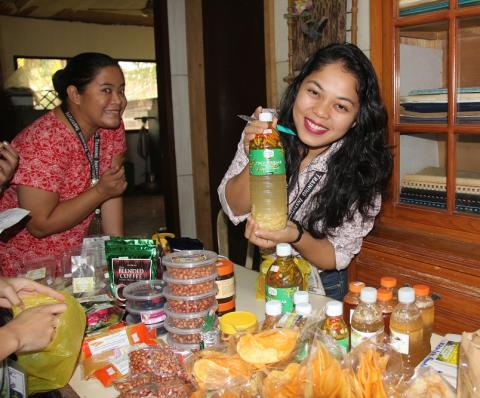Learning Site for Agriculture (LSA) focal person Cristine A. Galupo promotes a bottled spicy coconut vinegar which is one of the products of the center's LS partner. Vinegar is a staple dip/condiment on a typical Filipino table. Ms. Galupo is joined by Project Evaluation Officer I Cheriemy D. Generol.
The month of April has been declared as the official “Buwan ng Kalutong Pilipino” or Filipino Food Month. As per Presidential Proclamation no. 469 signed in 2018, the month-long celebration aims to honor our native food, local delicacies, and the Filipino cuisine in general.
A few years back, the Philippine Culinary Heritage Movement (PCHM) lobbied to the Department of Agriculture (DA) and the National Commission for Culture and the Arts (NCCA), requesting Malacañang to have every April as Filipino Food Month. The Presidential action took only 20 months since the first draft, and on April 13, 2018, the Presidential directive became official.
In Northern Mindanao, the Agricultural Training Institute-Regional Training Center X (ATI-RTC X) has been helping and assisting its farmer partners and their respective Learning Site for Agriculture (LSA) through trainings on production, value-adding, and food processing. At the moment, there are 31 Learning Site partners and 12 School for Practical Agriculture (SPA) which are into value adding and food processing.
“Some of the 43 farm partners are small-scale producers but at least they now know what to do with their farm produce. The training on value-adding was a big help to our farmers.”, said LSA point person Cristine A. Galupo of the Partnership and Accreditation Services Section (PASS).
Filipino Food Month is commemorated to promote, preserve, and ensure the transmission of the vast culinary traditions and treasures of our country for future generations, as well as to support those who produce our food from the various industries, like farmers and agri-communities. The said annual celebration aims to boost and promote the Philippines' culinary traditions and treasures as part of the nation's rich cultural heritage.

